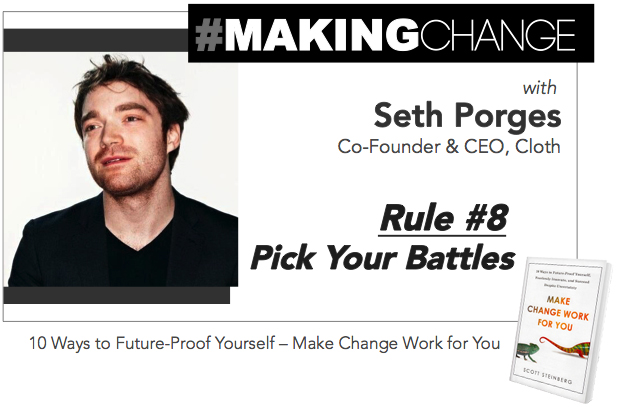Finding the courage to embrace change and take chances is the only way to succeed. We’ve asked some of our favorite industry power players and business innovators to share stories of how #MakingChange worked for them, as it relates to the ’10 Rules to Future-Proof yourself, fearlessly innovate, and succeed despite uncertainty’.
Rule #8 Pick Your Battles with Seth Porges – Co-founder & CEO, Cloth
Question: How did you get where you are today – and what tips would you give others hoping to follow in your footsteps?
Seth Porges: My background is a bit kooky. I spent most of my career as a journalist and magazine editor. I stumbled into writing about tech, which turned out to be the best crash-course in product-building one can imagine. When you play with every piece of hardware and software out there, you get a real sense of what works and what doesn’t; and what mistakes companies tend to end up with again and again. I also had access to—and could ask questions of—the smartest and most accomplished folks in the world. Before long, I realized that the founders and builders and engineers who make our built world aren’t that different from myself. That psychological barrier is a huge obstacle for many people wanting to bring their ideas to reality, and feeling it crumble is an energizing experience.
As for tips: Ask a ton of questions, and learn to love learning. As a journalist, I was really a professional question-asker. Today, I still ask questions: They are just about how we can make our product better.
Q: What does being courageous in life and business mean to you? What are some of the biggest concerns and fears you’ve faced and how have you overcome them?
SP: It’s hard to give up your routine and try something new. It’s cliche, and been said a million times, but a lot of people are terrified of failure. I like to go back to the analogy of how a baby learns to crawl and walk. It doesn’t just try it once and succeed and then enter a dance marathon. It stumbles again and again. And every time it stumbles, its neurons register what went wrong, and bake that into muscle memory and movements. Eventually, it walks perfectly, but that process takes a thousand failures. People have a hard time applying this logic to business or their personal lives. To me, being courageous is being willing to simply shed the innate fear of failure that we are either born with or learn at a young age.
Q: Describe “picking your battles” in your own words. What are ways in which you have exemplified this rule in your life or career.
SP: I’m a big fan of taking on seemingly pointless quests for fun and practice. The obvious, big fights are the ones everybody is focused on. It’s the small stuff that presents the most opportunity for change. If you can find a user behavior that is just the slightest bit inconvenient—but not so huge that a ton of other folks are already working on it—and make it better in a product; you can win big.
Q: What’s something no one ever tells people about what it takes to succeed?
SP: When you launch something and you’re in charge of making it work, your soul basically turns into a sponge for all the highs and lows. Every setback stings—and every victory rings—on a personal level that is simply not there if you’re working at a normal job. It’s pervasive, exciting, and not for the weak of heart or mind.
Q: What’s the surest way to innovate and stay ahead of the curve whether you’re a working professional, business, or even renowned thought leader?
SP: Ask questions, and spend time talking to your users or customers. You may think your brain is a bastion of innovation and unique snowflakes of thought gems, but you have to be able to adapt and respond what you do based on the needs of your users. This applies to folks in just about any profession—talk to the person who uses or receives whatever it is you produce, and ask them how to use it. Pierce your bubble. If folks are shoehorning random functions out of a product that wasn’t quite made for it, maybe that’s a good opportunity to make your product fit their needs, or even create something entirely new.
And default towards viewing others as collaborators rather than competitors. If you treat somebody as your enemy, they will respond as one. And really, that’s no way to go through life.
What are the battles that you’ve picked in your life or career? Use the hashtag#MakingChange to share your stories with us, and find them on makechangeworkforyou.com/blog.






